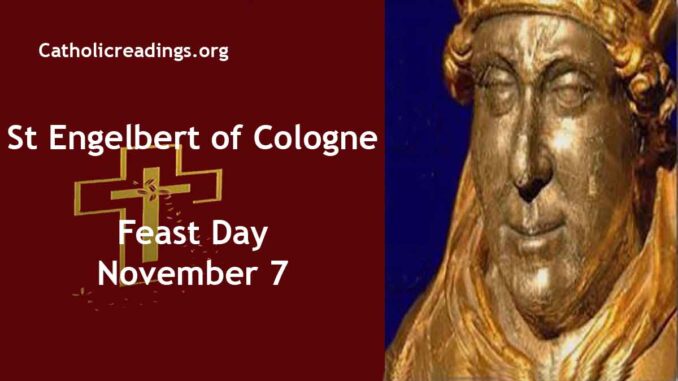St Engelbert of Cologne was also known as Engelbert of Berg.
He was the Archbishop of Cologne, Germany in the early 13th century.
He was born in 1185 AD in Berg, Germany, and died as a martyr on November 7 1225 in Gevelsberg, near Schwelm, Germany.
We celebrate his feast day on November 7 every year in the Catholic Church.
| St Engelbert of Cologne Biography | |
|---|---|
 |
|
| Date of Birth | 1185 AD |
| Place of Birth | Berg, Germany |
| Profession | Archbishop of Cologne |
| Place of Work | Cologne, Germany |
| Date of Death | November 7 1225 |
| Place of Death | Gevelsberg, near Schwelm, Germany |
| Feast Day | November 7 |
| Canonization | Pre-Congregation |
| Patron Saint of | Cologne |
St Engelbert of Cologne Life History
St Engelbert of Cologne was also known as Engelbert II of Berg. He was the son of the influential Count Englebert of Berg and Margaret, daughter of the Count of Gelderland.
He studied at the Cathedral School in Cologne, Germany. In a time when clerical and episcopal positions were a part of political patronage, Englebert was made provost of churches in Cologne and Aachen, Germany while still a young boy, and of the Cologne cathedral at age 14.
He led a worldly and dissolute youth; known for his good looks, keen mind, and wild ways. Englebert went to war to support his cousin, Archbishop Adolf, against Archbishop Bruno; for this, and for threatening to attack the Holy Roman Emperor Otto IV, both Engelbert and Adolf were excommunicated in 1206.
In 1208 Engelbert publicly submitted to the pope’s authority, and was received back into the Church. He fought the Albigensians in 1212. Chosen archbishop of Cologne on February 29 1216.
By this point, Engelbert had mellowed somewhat, and cared about his see, but still had worldly ambitions. To preserve the possessions and revenues of his see and the countship of Berg, he went to war with the Duke of Limburg and the Count of Cleves, restored civil order, demanded the allegiance of his nobles, erected defenses around his lands, and even prosecuted family members when needed.
He enforced clerical discipline, helped establish the Franciscans in his diocese in 1219 and the Dominicans in 1221, built monasteries and insisted on strict observance in them, and used a series of provincial synods to regulate church matters.
Engelbert was appointed guardian of the juvenile King Henry VII and administrator of the Holy Roman Empire by Emperor Frederick II in 1221.
He supervised the kingdom and the king’s education and placed the crown himself during Henry’s coronation in 1222. Worked for a treaty with Denmark at the Diet of Nordhausen on September 24 1223.
However, for all that he was loved by his people for the stability and security he brought, many of the nobility hated and feared him, and the archbishop had to travel with a troupe of bodyguards.
Pope Honorius III and Emperor Frederick II advised Engelbert to protect the nuns of Essen who were being oppressed and harassed by Engelbert’s cousin, Count Frederick of Isenberg.
To prevent action by the archbishop, Count Frederick and some henchmen ambushed Engelbert on the road from Soest to Schwelm, stabbing him 47 times. Considered a martyr as he died in the defense of religious sisters.
Related Links
Powered By SEO Experts
Follow @ReadingCatholic
